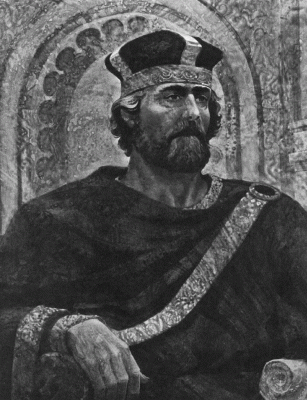I’ve said it before, and I’ll say it again, many of the stories we find in the Bible rival Shakespeare’s works in terms of their sweeping grandeur and poignant messages. In fact, as others more erudite than Joe Six-Pack have argued, without the Bible, much of what we take for literature would have no foundation on which to stand. What follows is an episode that could have come right out of the Bard’s Macbeth.
Pretty soon, on precisely January 30th, the daily readings for mass will present us with a story of treachery and kingly humility the likes of which we rarely, if ever, see in actual experience nowadays. I’m going to share it with you early for several reasons: A) many folks can’t make it to daily mass, so they’ll miss it; B) it’s an election year, and criticism of our leaders, and those who hope to replace them, is mounting; and C) as an example regarding who can be criticized, and how far we can go in doing so.
Let’s travel back in time to see what went down when King David’s son Absalom (yes, fruit of David’s loins, therefore one of Our Lord’s ancestors too) led a little coup d’état, and the king and his loyal troops beat feet out of the capitol. In the middle of all that clash and clamor, the king himself is crassly treated by one of his subjects. But first, a spy delivers a warning to the King.
An informant came to David with the report, “The children of Israel have transferred their loyalty to Absalom.” At this, David said to all his servants who were with him in Jerusalem:
“Up! Let us take flight, or none of us will escape from Absalom. Leave quickly, lest he hurry and overtake us, then visit disaster upon us and put the city to the sword.”
Trouble with Absalom had been brewing for sometime, see, so the king wasn’t exactly surprised. Note how the informant stays anonymous? Nobody likes an informant. And the king isn’t in the mood to dally either, as the murderous intent of his child is a known quantity. So after getting their gear together, the king and his company hit the road, on a march filled with sadness and whoa. The inspired writer paints the scene for us next, and sets the mood for a confrontation along the way.
As David went up the Mount of Olives, he wept without ceasing. His head was covered, and he was walking barefoot. All those who were with him also had their heads covered and were weeping as they went.
Why all the sad faces? Come on. As a parent, who doesn’t hope the best for their children? And what if one of your children is inscrutable and rotten to the core? I’d say it’s a good bet you would be acting just like the king here, and his retinue. Your own flesh and blood comes gunning for you, in clear violation of the law to “honor your parents.” David’s cup runneth over with epic, tragic, sadness.
As David was approaching Bahurim, a man named Shimei, the son of Gera of the same clan as Saul’s family, was coming out of the place, cursing as he came.
Oh, from the family of the deposed King Saul? This ought to be good! I hope the king is wearing his armor this time around. And note how the writer names him. From what little I have read of biblical exegesis, when folks are named in passages, it’s because they were important, or very well known to all who would hear the story later. It’s practically a given that everyone knew who Shimei was. And after this incident, no one would ever forget because,
He threw stones at David and at all the king’s officers, even though all the soldiers, including the royal guard, were on David’s right and on his left.
Doh! And you thought the guy who had the temerity to throw a shoe at President Bush II was bold! Shimei didn’t throw a stone or two and run either, but held his ground and held forth with oaths for,
Shimei was saying as he cursed, “Away, away, you murderous and wicked man! The LORD has requited you for all the bloodshed in the family of Saul, in whose stead you became king, and the LORD has given over the kingdom to your son Absalom. And now you suffer ruin because you are a murderer.”
Say what you will about Shimei, but anyone bold enough to start hurling invective and stones at the king and his cohort like this is not only bold, but has a death-wish, right? You know what they say about “payback.” Speaking of which, the Secret Service is gonna have this guy’s head as a trophy. The blood-lust rising for this act of disrespect on the king is hurtling forward as fast as a Shelby Cobra moves from 0 to 60.
Enter loyal subject #1, captain of the royal guard, and another named player, the warrior Abishai…
Abishai, son of Zeruiah, said to the king: “Why should this dead dog curse my lord the king? Let me go over, please, and lop off his head.”
He doesn’t mince words, does he? Why should he? And you have to admit, the writing of that dialogue line is very, very good. But I have to wonder if the explicatives were scrubbed out. You know, in the interest of brevity. But given the way things were back in the day, ‘ol Abishai was just stating the obvious. I mean, everybody knows you don’t hurl curses and stones at the king and live to tell about it. I’m surprised he even bothered to ask permission, but that he did points to King David’s character. If David was a blood thirsty tyrant, Abishai would not have bothered getting his permission first before, ahem, dealing with Shimei.
It’s a good thing he asked though for,
But the king replied: “What business is it of mine or of yours, sons of Zeruiah, that he curses? Suppose the LORD has told him to curse David; who then will dare to say, ‘Why are you doing this?’”
Whaat?! You have got to be kidding me, right? But then King David, knows himself, see. And in a shocking example of both his wisdom and humility, he even goes so far as to explain to his subordinates the reasons why! And how about this attitude of “what business is it of mine…that he curses?” Check out the explanation,
Then the king said to Abishai and to all his servants: “If my own son, who came forth from my loins, is seeking my life, how much more might this Benjaminite do so? Let him alone and let him curse, for the LORD has told him to. Perhaps the LORD will look upon my affliction and make it up to me with benefits for the curses he is uttering this day.”
Holy introspection, Batman! Put that in your dumfounded pipe and smoke it. For we live in an age where it seems as if our leaders can admit to doing no wrong whatsoever. That is unless damning video or audio tapes can prove it beyond a shadow of a doubt. And rarely if ever do we find one that lowers themselves down to the level of us normal folks. But back to the story at hand…
David and his men continued on the road, while Shimei kept abreast of them on the hillside, all the while cursing and throwing stones and dirt as he went.
And that is how the passage read to the faithful from this reading concludes. What are we to make of this story? To me, it’s a reminder that, for whatever reason, God works his will on earth through people. And not necessarily through only the right sort of people, but through the actions, words and thoughts of all kinds of them. And though King David had faults, sins, and other blemishes, he never lost sight of the fact that there is only one God, and that he was not Him.
His actions also show that he was ever open to the Transcendant, and humble enough to recognize the messengers of God, no matter who they were, or what their station was in life.
They that have ears, let them hear.
UPDATE: Speaking of Shakespeare, what if he wrote the story of the Three Little Pigs?













